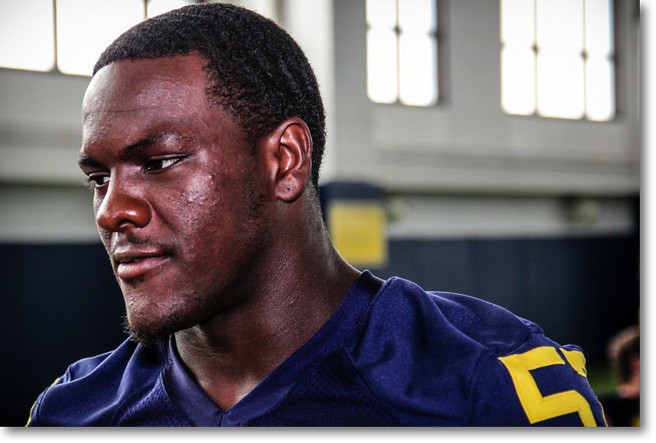
When the Seattle Seahawks drafted Frank Clark in the second round of last weekend's NFL Draft, the obvious question arose: how would organization handle Clark's November arrest for a domestic violence charge?
The details of the arrest report were disturbing; Brady Hoke called the incident "unacceptable" while dismissing Clark from the program; at the NFL Combine, Clark engaged in an unsettling bit of victim-blaming instead of shouldering the full responsibility for his actions.* Clark pled guity to reduced charges in April. For an NFL team looking to draft Clark, due diligence was required; this wasn't even Clark's first run-in with the law.
On Friday, Seahawks GM John Schneider said all the right things about the organization's investigation into the incident:
“Our organization has an in-depth understanding of Frank Clark’s situation and background,” Schneider told reporters in Renton after the second and third rounds on Friday. “We have done a ton of research on this young man. There hasn’t been one player in this draft that we have spent more time researching and scrutinizing more than Frank. That’s why we have provided Frank with this opportunity and are looking forward to him succeeding in our culture here in Seattle.”
Schneider said, based on the team's investigation, he didn't believe Clark hit his girlfriend, and domestic violence issues were a deal-breaker when evaluating players. That revelation came as quite the surprise to many, including witnessess of the November incident—witnesses who, according to a bombshell report in the Seattle Times today, were never consulted by the Seahawks:
But the Seahawks made him the 63rd overall pick in the draft, saying team officials had conducted an extensive investigation of their own and felt confident that the 6-foot-2, 277-pound Clark had not struck his girlfriend. The team acknowledged on Monday that their investigation did not include interviews with witnesses other than Clark.
The police report describing the incident quotes Diamond Hurt, then 20, saying Clark punched her in the face. Hurt’s younger brothers are quoted saying the same thing.
When Babson and Colie found her, Hurt “was just laying there,’’ Babson said. “She looked like she was unconscious to me.
“The kids were saying, ‘He killed my sister!’ ’’
Colie added that Hurt “was on the ground, curled up and holding her head and stuff.’’
Both women gave written statements to police via email the following day. But they say they never heard back from anybody about the case until The Seattle Times contacted them on Monday.
The Seahawks didn't perform a thorough investigation. They didn't even perform a half-assed one. They talked to the person they wanted to play football for them, heard what they wanted to hear, and willfully ignored a great deal of evidence that directly contradicted their conclusions.
It's a remarkable failure that hurts all parties involved.
It's an unfortunate reality-check for the ever-increasing number of people hoping the NFL will actually take domestic violence seriously, instead of doing the bare minimum to avoid negative PR. I can't imagine how the victim must feel seeing Clark's new employer take her alleged assailant at his word and make no effort to get the full story, one corroborated by multiple witnesses.
It also does no favors for Clark. While his alleged transgressions—and his subsequent statements—leave little room for sympathy, he's had his day in court and isn't subject to further discipline from the NFL; he should be able to move forward with his career, ideally with the support of an organization that is there to help him learn from his past and become a better person.
Seattle's investigation and its backlash, which is only just beginning, cast that into serious doubt. If the Seahawks feel obligated to correct their mistakes with this investigation, Clark will be the one looking for a job, and while he has nobody to blame but himself for being in that position, that doesn't mean it's justified. Cutting Clark may save some face for the organization, but that's about it, and it certainly doesn't help Clark find his way to a better path. If Clark remains, on the other hand, Seattle's initial handling of this doesn't instill confidence they'll do a whole lot to support Clark's growth as anything but a football player.
The Seahawks hurt themselves, too—at the very least they're facing a major controversy, and at worst they'll cut a second-round pick before he ever suits up for them—but they've somehow set themselves up as the least sympathetic party in this most recent ordeal.
What's perhaps the most galling is how unnecessary this is. Clark's alleged assault was common knowledge heading into the draft, and most expected he'd still get drafted; I don't think the central issue here is with him getting a chance to play in the NFL, or even that he got selected earlier than expected for a player with his off-field history. What concerns me most is this: Seattle didn't take the issue seriously, no matter what they say, and in doing so they set everyone up for failure.
-----------------
*Clark would later make a more contrite statement of apology (last paragraph). He still maintains he didn't strike the victim.